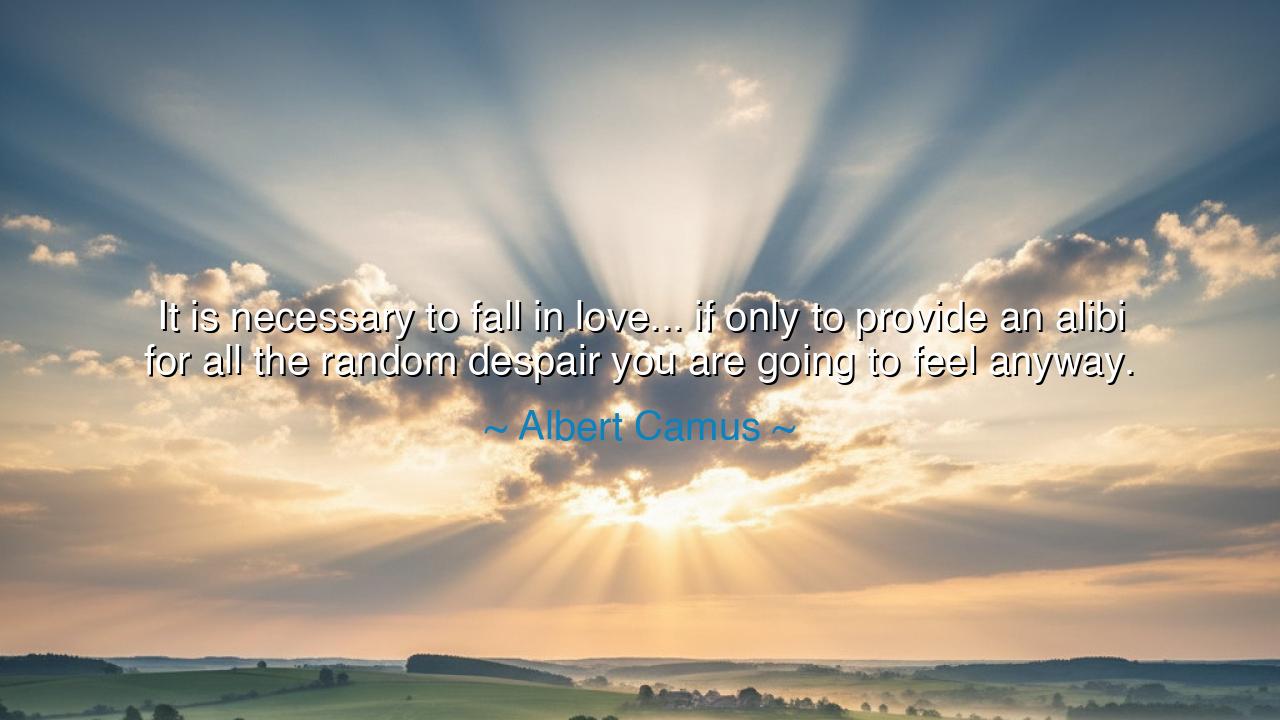
It is necessary to fall in love... if only to provide an alibi
It is necessary to fall in love... if only to provide an alibi for all the random despair you are going to feel anyway.






“It is necessary to fall in love… if only to provide an alibi for all the random despair you are going to feel anyway.” Thus wrote Albert Camus, the philosopher of the absurd, the poet of light and shadow, who walked the fine line between despair and defiance. His words come to us like a sigh from the depths of the human condition — a confession of both tenderness and irony. For Camus, love was not merely a pleasure of the heart, but a rebellion against the darkness of existence. To love, even foolishly, is to declare that life still holds meaning, even when reason cannot find it.
Camus lived in a century scarred by war, exile, and the collapse of certainty. His generation had seen empires crumble, ideologies betray, and faiths dissolve into silence. Amid such ruins, he sought not comfort, but clarity. His philosophy of the absurd teaches that life has no inherent meaning, yet the human heart cannot stop searching for one. Between this yearning and the emptiness of the universe lies a tension that gives rise to despair. Yet, instead of surrendering to it, Camus urged us to live — to embrace life’s contradictions, to find joy without illusion. And in this struggle, love becomes both a wound and a cure.
When he says it is “necessary to fall in love,” Camus does not speak of romance in the sentimental sense. He means that love — whether for a person, an idea, or life itself — gives form to our chaos. It becomes our alibi, our justification for existing in a world that offers no clear reason to exist. Love allows us to say, “I suffer, but for something.” It transforms aimless despair into purposeful sorrow. To love is to suffer meaningfully — to turn the ache of being into an offering. Even when it fails, love proves that the heart is still alive.
Consider the life of Vincent van Gogh, whose days were filled with torment, yet whose art was born of blazing passion. Though loneliness haunted him, he loved the world through his paintings — the trembling stars, the humble fields, the faces of peasants. He once wrote, “There is nothing more truly artistic than to love people.” His love did not save him from despair, but it redeemed it. Through love, his suffering became luminous; his despair, creative. Van Gogh lived out Camus’s truth: that to love, even in anguish, is to give one’s despair a soul.
Camus understood that despair is not an occasional guest but a constant presence — woven into the fabric of our being. No philosophy, no success, no pleasure can wholly erase it. And yet, he did not preach hopelessness. His wisdom lies in his honesty: since despair will come regardless, let us give it beauty, let us give it purpose. To fall in love, then, is to choose light amid darkness. It is to find in another person, or in a moment, a reflection of something eternal — a reason, however fragile, to keep breathing.
In the ancient sense, this is an act of heroism. For love requires courage: the courage to hope when the world is cold, to open one’s heart even when it has been wounded. The ancients called such courage eros, the divine madness that drives both poets and saints. It is not rational, nor safe, but it redeems the futility of life with the fire of passion. To love, Camus would say, is to live absurdly — to embrace the beauty of existence even when you know it will break your heart.
So, O children of the present age, take this lesson deeply: do not fear your despair, but give it a name. Let it become love. Love something wholly — a person, a calling, the sky at dawn — and let that love be your defiance against the void. For despair without love corrodes, but despair transformed by love becomes depth, becomes art, becomes life.
In the end, Camus’s wisdom is this: we are all wanderers in an indifferent universe, but love allows us to walk with purpose. To fall in love — even knowing its futility — is to refuse nihilism, to turn suffering into song. Thus, when despair comes, as it always does, you may meet it not as a victim, but as a lover — one who has made peace with the absurd by loving, still, and loving always.






AAdministratorAdministrator
Welcome, honored guests. Please leave a comment, we will respond soon